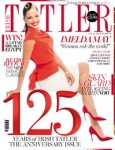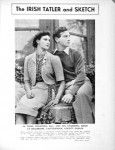Dr. Caitriona Clear of NUI Galway reflects on an important realisation about the state of Irish women’s history while reading the legendary Irish Tatler magazine
by Dr. Caitriona Clear
 I bought the 125th-anniversary November issue of the Irish Tatler (formerly IT, before that again, the Irish Tatler and Sketch, before that, The Lady of the House) recently because I’d given a bit of help to one of the journalists, Jessica O’Shea, for an article on the history of Irish magazines in general – not that I ever need an excuse to buy a magazine. There are several intriguing articles in it which have a backward glance but one of them in particular, entitled ‘Founding Mothers’ by Carissa Casey, looks at Irish women’s political, economic and social history from the early twentieth century. There are of course the obligatory photos of Gonne and Markievicz, but a page-length photo of Jennie Wyse Power and smaller photographs of less prominent women caught my attention. I read the article with great interest, and like a good academic, could not help wondering what books and articles on twentieth-century Irish women’s history she had used – MacCurtain? Cullen? Cullen Owens? Ward? Murphy? Clancy? Ryan? O hOgartaigh? Hill? Matthews? Valiulis? Beaumont? Myself? None of our names were mentioned. Then it hit me. She doesn’t need footnotes or bibliography. This information, this knowledge, that we have been collecting, publishing, arguing about and building on for the last 35-40 years, is now in the public domain. It has reached a critical mass whereby it does not need to be identified with any one historian or any group of historians, any more than knowledge about 1916 or the First World War or the War for Independence, does.
I bought the 125th-anniversary November issue of the Irish Tatler (formerly IT, before that again, the Irish Tatler and Sketch, before that, The Lady of the House) recently because I’d given a bit of help to one of the journalists, Jessica O’Shea, for an article on the history of Irish magazines in general – not that I ever need an excuse to buy a magazine. There are several intriguing articles in it which have a backward glance but one of them in particular, entitled ‘Founding Mothers’ by Carissa Casey, looks at Irish women’s political, economic and social history from the early twentieth century. There are of course the obligatory photos of Gonne and Markievicz, but a page-length photo of Jennie Wyse Power and smaller photographs of less prominent women caught my attention. I read the article with great interest, and like a good academic, could not help wondering what books and articles on twentieth-century Irish women’s history she had used – MacCurtain? Cullen? Cullen Owens? Ward? Murphy? Clancy? Ryan? O hOgartaigh? Hill? Matthews? Valiulis? Beaumont? Myself? None of our names were mentioned. Then it hit me. She doesn’t need footnotes or bibliography. This information, this knowledge, that we have been collecting, publishing, arguing about and building on for the last 35-40 years, is now in the public domain. It has reached a critical mass whereby it does not need to be identified with any one historian or any group of historians, any more than knowledge about 1916 or the First World War or the War for Independence, does.
 It will soon be the 40th anniversary of the publication of Margaret MacCurtain and Dáithí O Corráin’s ground-breaking edited collection of essays on women’s history. Perhaps someone will think of re-issuing it as an anniversary volume. And not long after that will be the 30th anniversary of the founding of the WHAI. We should celebrate our achievements and acknowledge all we have accomplished, but for me, the most fitting testament to our ongoing labours is Carissa Casey’s lovely, accessible article that girls and women who never thought they were interested in history at all will read for relaxation and comfort, at home, in coffee shops, on buses, and in hairdressers.
It will soon be the 40th anniversary of the publication of Margaret MacCurtain and Dáithí O Corráin’s ground-breaking edited collection of essays on women’s history. Perhaps someone will think of re-issuing it as an anniversary volume. And not long after that will be the 30th anniversary of the founding of the WHAI. We should celebrate our achievements and acknowledge all we have accomplished, but for me, the most fitting testament to our ongoing labours is Carissa Casey’s lovely, accessible article that girls and women who never thought they were interested in history at all will read for relaxation and comfort, at home, in coffee shops, on buses, and in hairdressers.
